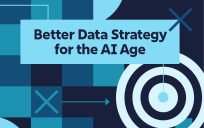Our relationship with data is changing. Maybe you see the shift in your current role or feel the exhaustion of sharing static Excel spreadsheets. No agency has all aspects of data sharing down to a science, but we are seeing greater awareness around what data can do and improvements around sharing and using it more effectively.
At NASA, for example, data is shaping how the agency embeds diversity, equity, inclusion and accessibility into the fabric of the organization in more strategic ways. The focus is both on the internal makeup of teams across NASA and who the agency does business with, said Chief Data Officer Ron Thompson.
Speaking during a recent GovLoop online training on the power of data sharing, Thompson explained that much of NASA’s funding is disbursed through grants and research projects to partner organizations and universities. Data is providing a lens through which the agency can now look across its centers and determine who is represented at all levels of leadership. What opportunities are accessible to various parts of the workforce? Are grants and research opportunities accessible, including to historically Black colleges and universities?
“We needed to change the way we were doing business and issuing opportunities,” Thompson said.
And that speaks to the power of what data can do when it’s tied to a clear purpose and used to unlock different discoveries. During the panel discussion, Thompson, along with data enthusiasts from Deloitte and cloud-based data provider Snowflake, offered tips and best practices to fuel data efforts. Here’s a roundup of what they shared.
- Make data FAIR.
That is Findability, Accessibility, Interoperability and Reusability. FAIR principles prepare agencies to take advantage of technologies such as machine learning as the complexity and amount of data continues to outpace our human capacity to find, access, interoperate and reuse it. Thompson stressed the importance of making data FAIR as NASA seeks to tackle this question: “How do [we] share the information that we have more broadly and more efficiently?”
As a member of the Federal CDO Council, Thompson is involved in prototype efforts to share domain data. One example could be supply chain data, especially as agencies seek to better understand the various components in their supply chain, as well as any disruptions.
- Apply pressure to the culture
“I think the biggest challenge we have are cultural impediments of how we’ve done things in the past,” Thompson said. The approach to that has been applying what he called slow and steady pressure, whether that’s through co-leading digital transformation efforts at NASA or finding synergies across the agency.
- Redefine the path to success
The organizations that are going to succeed with data and analytics are those that change their stance on data sharing, said Monica McEwen, Managing Director, Global Public Sector Analytics & Cognitive at Deloitte. “Data sharing is a business necessity,” McEwen said.
Citing Gartner, she explained that the stance around data sharing must evolve from
- Don’t share unless
- To must share unless
- Use data as a window, not just a mirror
We’ve grown accustomed to using data as a mirror, to tell us what we’ve done in the past, for example, said Nick Speece, Chief Federal Technology Officer at Snowflake. True transformation doesn’t come from sharing 90-day-old data and forcing agencies to predict reality. And, yes, that includes sharing static spreadsheets.
What agencies really need is a window into the world in which they operate, Speece said. They want to know what the data means, how it can relate to stakeholders and how that information informs the development of future products and services to make them better.
- Use data as jet fuel
Data as jet fuel was a recurring theme throughout the panel. No surprise considering NASA’s presence during the discussion. But there is recognition that data is growing in importance in every agency, McEwen said. The key is ensuring you have a sound data strategy and plan for using data to fuel the mission.
“All of us benefit from good data,” Speece said. “All of us benefit from collaboration.”
This online training was brought to you by:







Leave a Reply
You must be logged in to post a comment.